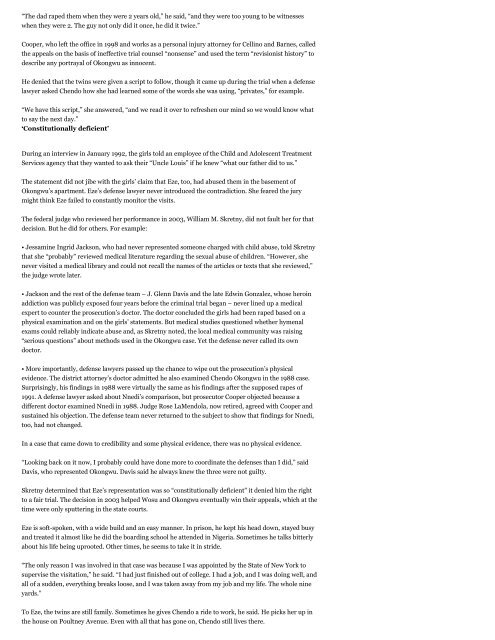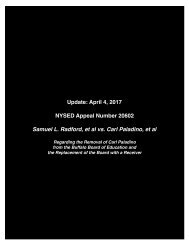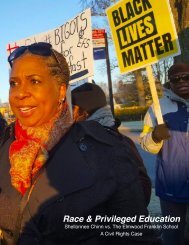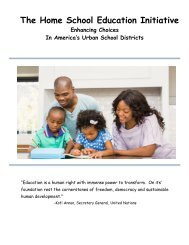A 163 Year Sentence
- No tags were found...
You also want an ePaper? Increase the reach of your titles
YUMPU automatically turns print PDFs into web optimized ePapers that Google loves.
“The dad raped them when they were 2 years old,” he said, “and they were too young to be witnesses<br />
when they were 2. The guy not only did it once, he did it twice.”<br />
Cooper, who left the office in 1998 and works as a personal injury attorney for Cellino and Barnes, called<br />
the appeals on the basis of ineffective trial counsel “nonsense” and used the term “revisionist history” to<br />
describe any portrayal of Okongwu as innocent.<br />
He denied that the twins were given a script to follow, though it came up during the trial when a defense<br />
lawyer asked Chendo how she had learned some of the words she was using, “privates,” for example.<br />
“We have this script,” she answered, “and we read it over to refreshen our mind so we would know what<br />
to say the next day.”<br />
‘Constitutionally deficient’<br />
During an interview in January 1992, the girls told an employee of the Child and Adolescent Treatment<br />
Services agency that they wanted to ask their “Uncle Louis” if he knew “what our father did to us.”<br />
The statement did not jibe with the girls’ claim that Eze, too, had abused them in the basement of<br />
Okongwu’s apartment. Eze’s defense lawyer never introduced the contradiction. She feared the jury<br />
might think Eze failed to constantly monitor the visits.<br />
The federal judge who reviewed her performance in 2003, William M. Skretny, did not fault her for that<br />
decision. But he did for others. For example:<br />
• Jessamine Ingrid Jackson, who had never represented someone charged with child abuse, told Skretny<br />
that she “probably” reviewed medical literature regarding the sexual abuse of children. “However, she<br />
never visited a medical library and could not recall the names of the articles or texts that she reviewed,”<br />
the judge wrote later.<br />
• Jackson and the rest of the defense team – J. Glenn Davis and the late Edwin Gonzalez, whose heroin<br />
addiction was publicly exposed four years before the criminal trial began – never lined up a medical<br />
expert to counter the prosecution’s doctor. The doctor concluded the girls had been raped based on a<br />
physical examination and on the girls’ statements. But medical studies questioned whether hymenal<br />
exams could reliably indicate abuse and, as Skretny noted, the local medical community was raising<br />
“serious questions” about methods used in the Okongwu case. Yet the defense never called its own<br />
doctor.<br />
• More importantly, defense lawyers passed up the chance to wipe out the prosecution’s physical<br />
evidence. The district attorney’s doctor admitted he also examined Chendo Okongwu in the 1988 case.<br />
Surprisingly, his findings in 1988 were virtually the same as his findings after the supposed rapes of<br />
1991. A defense lawyer asked about Nnedi’s comparison, but prosecutor Cooper objected because a<br />
different doctor examined Nnedi in 1988. Judge Rose LaMendola, now retired, agreed with Cooper and<br />
sustained his objection. The defense team never returned to the subject to show that findings for Nnedi,<br />
too, had not changed.<br />
In a case that came down to credibility and some physical evidence, there was no physical evidence.<br />
“Looking back on it now, I probably could have done more to coordinate the defenses than I did,” said<br />
Davis, who represented Okongwu. Davis said he always knew the three were not guilty.<br />
Skretny determined that Eze’s representation was so “constitutionally deficient” it denied him the right<br />
to a fair trial. The decision in 2003 helped Wosu and Okongwu eventually win their appeals, which at the<br />
time were only sputtering in the state courts.<br />
Eze is soft-spoken, with a wide build and an easy manner. In prison, he kept his head down, stayed busy<br />
and treated it almost like he did the boarding school he attended in Nigeria. Sometimes he talks bitterly<br />
about his life being uprooted. Other times, he seems to take it in stride.<br />
“The only reason I was involved in that case was because I was appointed by the State of New York to<br />
supervise the visitation,” he said. “I had just finished out of college. I had a job, and I was doing well, and<br />
all of a sudden, everything breaks loose, and I was taken away from my job and my life. The whole nine<br />
yards.”<br />
To Eze, the twins are still family. Sometimes he gives Chendo a ride to work, he said. He picks her up in<br />
the house on Poultney Avenue. Even with all that has gone on, Chendo still lives there.






